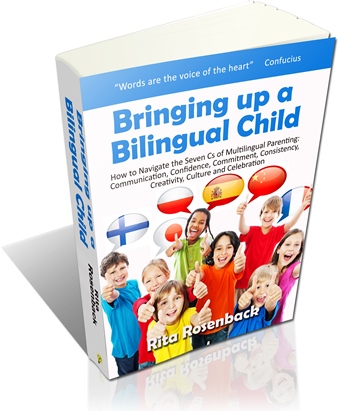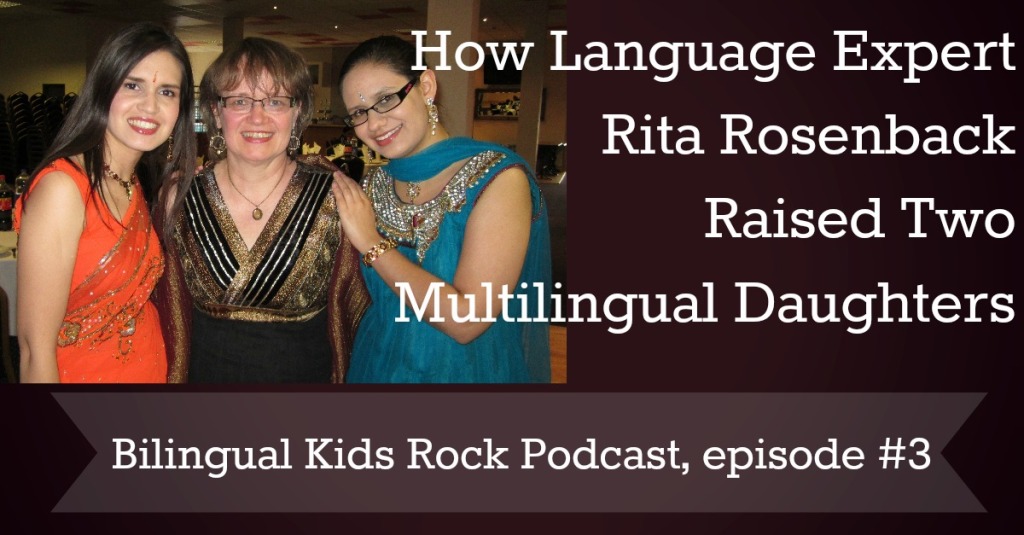Is it really realistic to raise multilingual children? Is it even possible? How does one begin to do it?
Rita Rosenback may just have all of the answers for us. Not only is she a parent to two multi-lingual children but she is also an actual language expert.
Rita is multi-lingual herself- knowing how to speak English, Swedish, Finnish and German.
Besides that Rita has had a long list of careers related to multi-lingualism. Also she is the author of “Bringing Up A Multilingual Child” and the founder of Multilingualparenting.com
How could Bilingual Kids Rock not reach out to a woman with these amazing credentials on multi-lingualism?!
Listen to How Language Expert Rita Rosenback Raised Two Multilingual Daughters on iTunes
Listen to How Language Expert Rita Rosenback Raised Two Multilingual Daughters on Stitcher
Below are snippets of our very interesting and educational conversation with her:
BKR: Hi Rita. Where are you from and how did you become a multilingual person?
Rita: I was actually born in Finland in a Swedish speaking area. I have a Finnish mom and a Swedish dad so I immediately picked up on those two languages. I also went to a Swedish school except for one year when I was nine when I wanted to go to a trial Finnish school.
In Finland you learn English in school so that’s where I picked up on English. We also got a lot of English on TV. My English has also been strengthened by having lived in England for the last 16 years.
BKR: You mentioned you had two daughters- Daniela and Mina and in your blog you interviewed Daniela and she mentioned that she also spoke 4 languages and is in the process of learning a fifth one. How did that happen?
Rita: Their father, my ex-husband is from India so his mother tongue is Punjabi. When the girls were growing up, I spoke Swedish to them and he spoke Punjabi.
When we moved to England Daniela did not know any English at all. It took her about three months before she started speaking it and a little longer before she got fluent in it. Daniela always loved languages and learned German in school and during her stays in Germany.
Since Daniela did not get to learn Finnish before we moved away she has taken it upon herself to learn Finnish and enrolled in a Finnish course in school.
BKR: What languages do the girls prefer to speak with each other?
Rita: They speak English with each other because that is their peer’s language and that’s where they’ve gone to school and university but sometimes they can speak Punjabi or Swedish to one another but mainly English.
BKR: From our understanding, you raised your daughters speaking 1 language and your husband spoke another. The community language then became the third language. Did you ever feel like there was missing communication?
Rita: Yes, because we used three languages all within the family there was always the chance of that but with that said even in a mono-lingual family there are also miscommunications.
Because as parents we agreed in raising our children with more than one language we were always accepting that there were situations that we felt like we didn’t understand and if we wanted to understand we would just ask and translate. As a result we didn’t really have any major problems because we had agreed that this was the way we were going to do it.
BKR: You are also a translator and interpreter. How did you come to making languages a career? Did you actively choose it?
Rita; After doing my A levels I found myself really interested in languages so that’s what I studied in university. I also studied some time in Germany so languages have always been so close to my heart.
BKR: Did you find that the knowledge you acquired made you a little bit of a perfectionist in raising bilingual children?
Rita: You may think that but that didn’t really happen to me. For me language has always been about communication and doesn’t have a value unless you really use it for communication. Because of this I never expected perfection from my girls. As long as they are confident communicators I am fine with that.
BKR: Was there any urgency to switch to English when you moved to England? Did you get any bad advice?
Rita: We didn’t really get any bad advice. When we moved to England we didn’t speak any English at all at home and simply trusted that the children would learn it from school. I never had any comments from teachers that we should do this or that so I was very lucky in that respect.

Read Rita Rosenback’s book – “Bringing up a Bilingual Child”. It is an easy-to-read handbook for parents raising bilingual children in families with more than one language.
BKR: When you moved to England, your youngest daughter was still 6. What were your ways to support the second language in the house?
Rita: We just really stuck to our one parent one language and we were always consistent with it.
Also we didn’t make a big deal out of it if Daniela came home from school and told me something in English. I would just slowly try to steer me into Swedish.
BKR: What about literacy? Did you teach them to read and write in Swedish?
Rita: Minna already knew how to read and write in Swedish and Finnish. With Daniela I didn’t teach her Swedish. It actually came later in emails and text messages that we send.
She had read books and so she knew how to read but had not been writing up to then but she can write now. As with Punjabi, they both learned that at school in the UK.
BKR: How do you think being bilingual had an impact on your becoming bicultural as well?
Rita: To me language and culture go hand in hand and you can’t have one without the other. The more you learn about language the more you learn about culture.
I would say if you move from one country to another it takes about 5 years before you can feel home and now I do feel at home in England but we still have a house in Finland and go back there every summer.
BKR: Do you have any examples of your daughters being bicultural?
Rita: My daughters feel at home whether they are in Finland, England and India. They know the traditions of their grandparents and when they go there they can take part in anything. They understand the culture.
My eldest daughter got married last year and it was a traditional Indian wedding. So yes they really feel at home wherever they are.
BKR: Your daughter is studying to be a doctor. How does languages help her chosen career?
Rita: Well she can practice in Finland if she wants to or if she chooses to practice in England her Punjabi will come in handy because there is a huge Punjabi speaking population here.
BKR: How did you switch from completely speaking one language to them (Finnish) to the other (Swedish).
Rita: I just switched completely. When I felt that the kids a good base in one language I completely switched to the other. The good thing is that the kids still remember their Finnish. Because we switched it doesn’t come as easy to them but they still fully understand. When we go to Finland it takes them a little while but they are eventually able to dive into it fully.
BKR: How did you find the balance from being strict in their language but still have a good relationship with your children?
Rita: If you are very consistent yourself then I feel it comes naturally. If you do it from the start and never switch then the kids will get used to it. I’ve never felt like there was a big problem.
BKR: Did you ever feel uncomfortable using your minority language in public?
Rita: No, I never even really thought about that because it was so innate with me that this was the language that I spoke with my children. It was only when it was impolite to use it, if someone would feel that they don’t understand that I switched.
BKR: What would be your advice to parents who are looking to raise a multilingual child?
Rita: My advice is to discuss it in advance. Agree on what you want for your kids- which languages and how fluent you want them to be. After that choose a strategy and stay consistent.
Stay consistent but don’t make it a battleground. Create a need to speak the language and have fun with it. Make the kids want to speak the language.
Listen to How Language Expert Rita Rosenback Raised Two Multilingual Daughters on iTunes
Listen to How Language Expert Rita Rosenback Raised Two Multilingual Daughters on Stitcher

